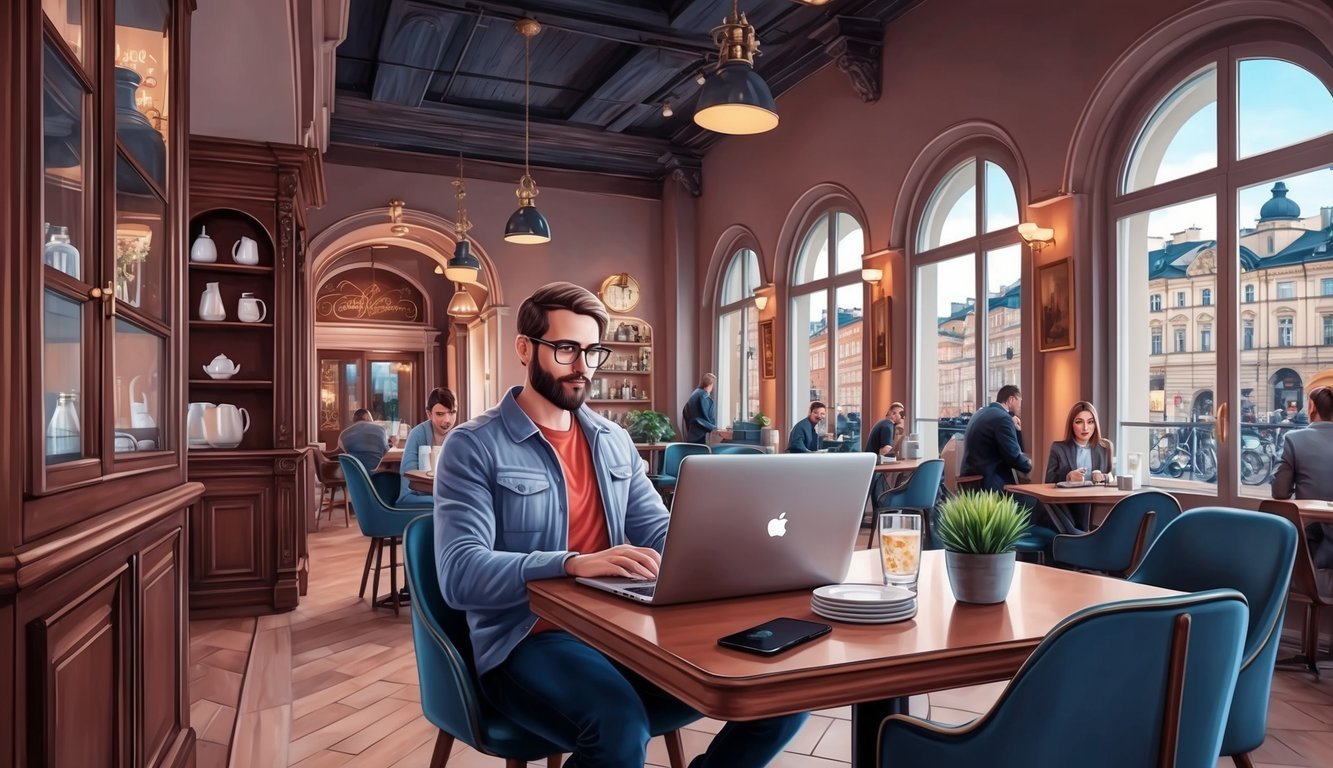Warsaw is becoming a top choice for digital nomads looking for a balance between work and life.
The city offers affordable living, great food, and a lively culture that makes it easy to enjoy your free time while you work remotely.
With modern amenities and a growing community of fellow nomads, it’s easy to see why many are drawn to this vibrant capital.
Getting around Warsaw is straightforward, with public transport that’s both reliable and affordable.
You’ll find plenty of cozy cafes and co-working spaces that cater to remote workers, helping you stay productive.
The mix of history and modernity in this city adds a unique charm that enhances your experience.
From delicious local cuisine to exciting leisure activities, Warsaw has something to offer everyone.
Take a stroll through its parks or explore its rich history, and you might just find that this city feels like home.
Key Takeaways
- Warsaw is affordable and welcoming for digital nomads.
- Public transport and workspaces are easily accessible.
- The city’s culture and food enrich your stay.
Getting to Know Warsaw
Warsaw is a city with a rich history and vibrant culture that welcomes digital nomads.
Its unique blend of old and new, along with practical information about geography and language, will make your stay enjoyable and productive.
History and Culture
Warsaw’s history is a fascinating tale of resilience.
The city was almost completely destroyed during World War II but was rebuilt to honor its heritage.
The Old Town, a UNESCO World Heritage site, showcases beautiful architecture and charming streets.
You can explore significant places like the Warsaw Uprising Museum, which tells the story of the local fight against Nazi occupation.
The local culture is a mix of traditional Polish customs and modern influences, making it a lively environment for creative minds.
Don’t miss local food markets and art festivals throughout the year.
Geography and Climate
Located on the banks of the Vistula River, Warsaw has a flat landscape with parks scattered around for relaxation.
The city is well connected, making it easy for you to explore various neighborhoods.
The climate is typical of Central Europe, with warm summers and cold winters.
Average temperatures in summer can reach around 25°C (77°F), while winter can drop below freezing.
Always check the weather before you pack for your trip, as conditions can change rapidly.
Language and Communication
Polish is the official language spoken in Warsaw.
While it may seem challenging, many locals, especially younger people, speak English.
Learning a few basic Polish phrases can go a long way in connecting with the residents.
Mobile connectivity is strong, with excellent internet connectivity in cafes and coworking spaces.
This makes it easy for you to stay connected while working remotely.
Many cafes offer free Wi-Fi, so finding a good workspace is simple.
Digital Nomad Essentials
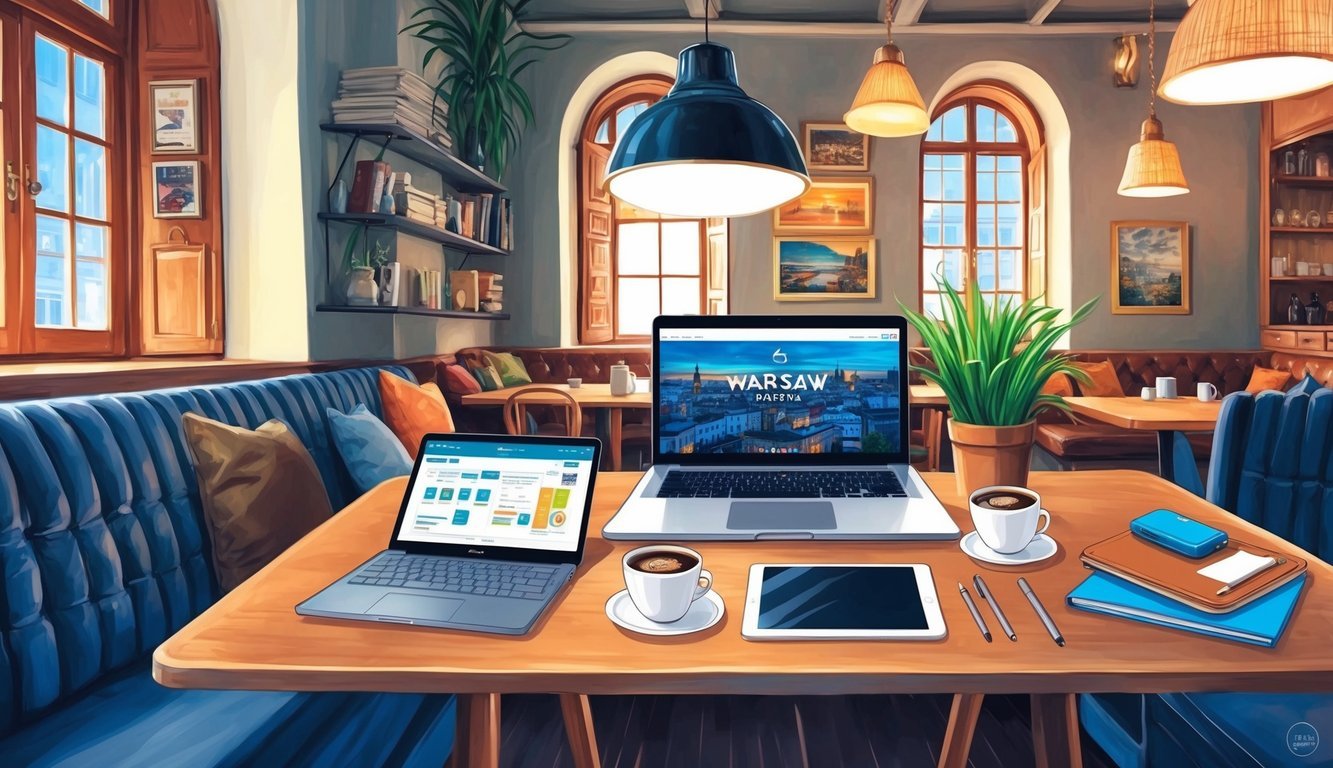
As a digital nomad in Warsaw, you’ll want to know where to work, how to stay connected, and how to find your community.
Here are the essentials to help you thrive in this vibrant city.
Co-Working Spaces
Warsaw has a variety of co-working spaces that cater to remote workers.
A few popular options include:
- HubHub: Known for its stylish design and great amenities. It offers meeting rooms and networking events.
- Brain Embassy: This space stands out for its creative vibe and supportive community, perfect for collaboration.
- Campus Warsaw: A startup hub that includes co-working areas and access to workshops and talks.
- Reaktor: A place focused on tech and innovation, offering great facilities for developers and creatives.
- Mindspace: A beautifully designed space with a relaxed atmosphere, which also hosts community events.
Each spot provides comfortable environments, high-speed Wi-Fi, and the opportunity to meet other like-minded digital nomads.
Internet and Connectivity
Staying connected is key for any digital nomad.
Warsaw boasts excellent internet infrastructure, ensuring you can work without interruptions.
- Fast Internet: Many co-working spaces offer speeds exceeding 100 Mbps.
- Wi-Fi Availability: Most cafes and public places provide free Wi-Fi, making it easy to work from anywhere.
- Mobile Plans: If you prefer working remotely, consider getting a local SIM card. Providers like Play and Orange offer affordable unlimited data plans.
With these options, you can choose what works best for your lifestyle and stay connected with ease.
Networking and Community
Connecting with other digital nomads can enrich your experience in Warsaw.
There are plenty of ways to network and meet new people.
- Meetups: Websites like Meetup.com feature various events focused on tech, remote work, and more. These gatherings are great for making friends and sharing ideas.
- Networking Events: Look out for events organized by co-working spaces or local startups. They often host talks and workshops, giving you a chance to learn while meeting others.
- Social Media Groups: Join groups focused on digital nomads in Warsaw to stay updated on events and connect with others in the area.
Engaging with the local community can provide support and inspiration while you navigate your remote work journey.
Living in Warsaw
Living in Warsaw offers an exciting blend of affordable options and modern amenities.
You’ll find a variety of accommodation styles, reasonable living costs, and solid healthcare services that cater to digital nomads.
Accommodation Options
Finding a place to live in Warsaw is quite easy.
You can choose from private apartments, shared flats, or even hostels, depending on your budget and preferences.
- Private Apartments: Prices typically range from €300 to €600 per month for a studio or one-bedroom.
- Shared Flats: You might spend about €150 to €300 if you prefer splitting costs with others.
- Hostels: If you’re just starting out, consider a hostel that can cost around €10 to €30 per night.
Many listings can be found on platforms like Airbnb, or local websites.
Cost of Living and Budget Tips
The cost of living in Warsaw is lower than many other European capitals.
Here’s a snapshot to help you budget:
- Groceries: Expect to pay about €150 monthly.
- Dining Out: A meal in a mid-range restaurant is around €10-€15.
- Utilities: Average monthly costs for internet and utilities are about €100 to €150.
To save more, consider shopping at local markets for fresh produce rather than supermarkets.
Also, using public transportation—trams and buses—can be an economical choice to explore the city.
Healthcare and Safety
Healthcare in Warsaw is generally good and quite affordable.
Most public healthcare options are available to residents and visitors, though private clinics offer quicker service and better comfort.
- Healthcare Costs: A typical doctor’s appointment may cost around €30-€50.
- Emergency Services: Dialing 112 will get you emergency help.
In terms of safety, Warsaw is considered safe for tourists and expats.
Petty crime exists, so stay alert in crowded areas.
For additional peace of mind, consider travel insurance that covers health needs during your stay.
Getting Around
Getting around Warsaw is pretty simple and offers plenty of options.
From public transport to walking or cycling, you’ll find ways that suit your pace and style.
The city is designed for convenience, so you can explore with ease.
Public Transport and Accessibility
Warsaw has an efficient public transport system, including buses, trams, and a well-connected metro.
You can buy tickets at kiosks, machines, or through a mobile app.
A single ticket costs around 4.40 PLN, allowing travel on all modes for a set time.
Key tips:
- Buses and Trams: They run frequently and cover most areas.
- Metro: Fast and reliable, ideal for longer distances.
- Accessibility: Many stations and buses are accessible for those with mobility challenges.
Districts and Navigation
Navigating through Warsaw’s districts adds to the adventure.
Key areas include Mokotów, known for its parks, and Praga, where you can enjoy a hip vibe.
Use Google Maps or local apps for easy navigation.
Here’s a quick overview of some districts:
- Śródmieście: Central hub full of shops, restaurants, and attractions.
- Mokotów: Quieter, great for relaxation and local eateries.
- Praga: Artsy with a unique charm, good for nightlife.
Whether you’re walking, biking, or taking public transport, all these neighborhoods are accessible and worth the visit.
Grab your bike or lace up your walking shoes to see what each district has to offer!
Food and Dining
Warsaw offers a vibrant food scene that celebrates local flavors and diverse dining options.
You can easily enjoy traditional Polish dishes and explore the city’s restaurant culture, making meal times an exciting part of your experience.
Polish Cuisine and Local Dishes
Polish cuisine is hearty and satisfying.
A must-try is pierogi, which are dumplings filled with various ingredients like potatoes, cheese, or meat.
They’re typically boiled or fried and served with sour cream.
Another classic dish is bigos, also known as hunter’s stew.
It combines sauerkraut and fresh cabbage with different meats and spices, creating a rich flavor.
If you’re in the mood for soup, don’t miss żurek, a sour rye soup often served with sausage and egg.
You can find these dishes in many local eateries and cafes throughout the city.
Be sure to sample the delicious street food, too, like zapiekanka, a Polish-style baguette topped with mushrooms, cheese, and sauces.
Dining Out and Restaurant Culture
Dining out in Warsaw is affordable and enjoyable.
Many restaurants offer Polish cuisine at reasonable prices.
A meal at a casual spot may cost around $5-10, while a three-course dinner for two at a mid-range restaurant might set you back $30-40.
You can also find a variety of international restaurants, so there’s something for every taste.
Look for food markets and street vendors for quick bites.
Enjoying outdoor seating during warmer months is common, creating a lively atmosphere.
Poles appreciate good food, so meal time is often a social event.
Don’t hesitate to ask locals for their favorite dining spots; they’ll gladly share recommendations to enhance your culinary journey.
Leisure and Entertainment
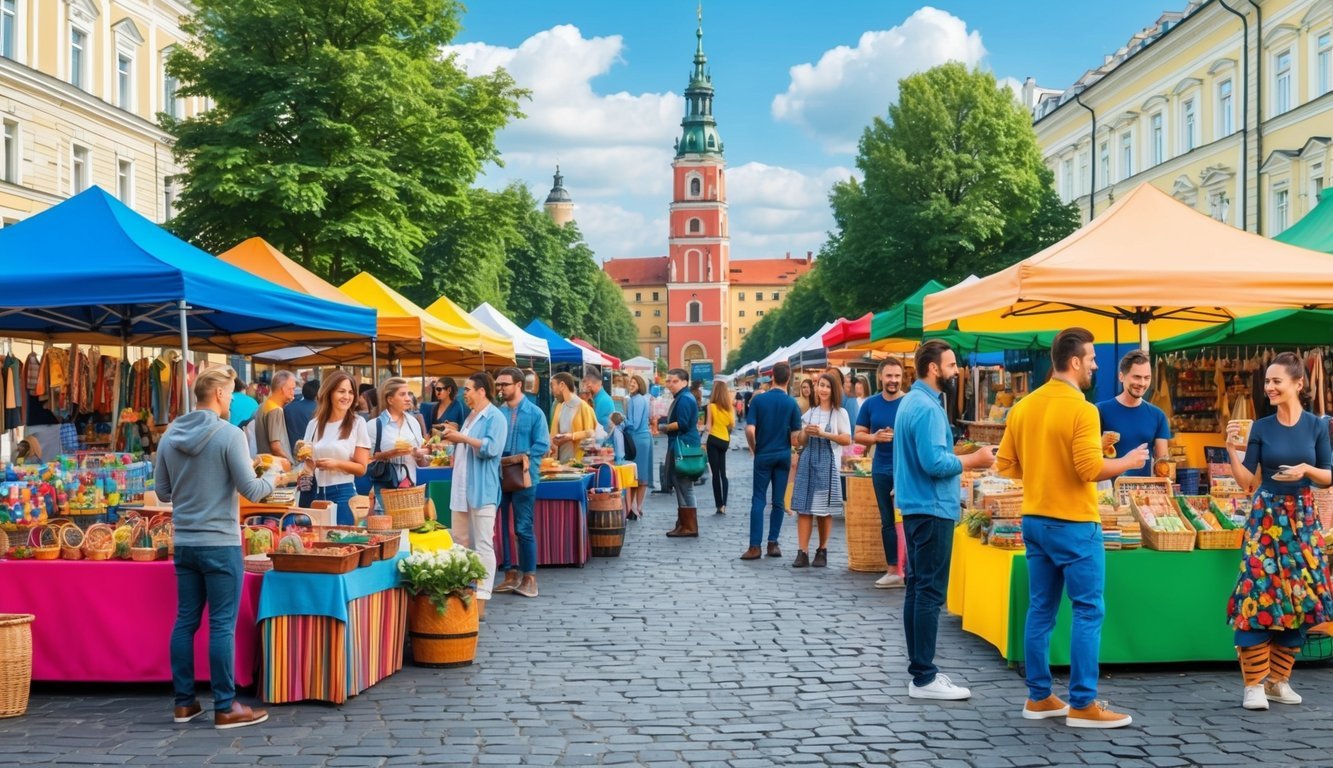
Warsaw offers a vibrant blend of parks and nightlife that makes it a fantastic place for digital nomads.
You can enjoy relaxing green spaces during the day and dive into a lively social scene at night.
Parks and Nature
When you need a break from work, head to Łazienki Park.
This beautiful park is filled with stunning gardens, historic palaces, and plenty of open space to relax.
You might even spot a peacock wandering around!
Another popular spot is Saski Garden.
It’s a perfect place for a stroll or a picnic.
With paths lined by trees and fountains, it’s very peaceful.
If you’re looking for something more adventurous, check out The Vistula Boulevards.
You can walk, jog, or bike along the river.
You’ll find cafes and beach bars, making it a fun place to hang out with friends.
Nightlife and Social Scene
Warsaw’s nightlife is diverse and exciting.
Whether you want a quiet drink or a night of dancing, you have plenty of options.
Start your night in Praga District, known for its unique vibe.
Bars like Saska Kępa offer cozy atmospheres along with great cocktails.
If you’re in the mood to dance, head to clubs like Level 27.
This rooftop club offers breathtaking views and great music.
You can also explore live music venues scattered throughout the city.
Places like Hydrozagadka host local bands and offer a great way to experience the local scene.
With a mix of laid-back spots and lively clubs, you’ll find the perfect way to unwind after a long day.
Practical Tips for Digital Nomads
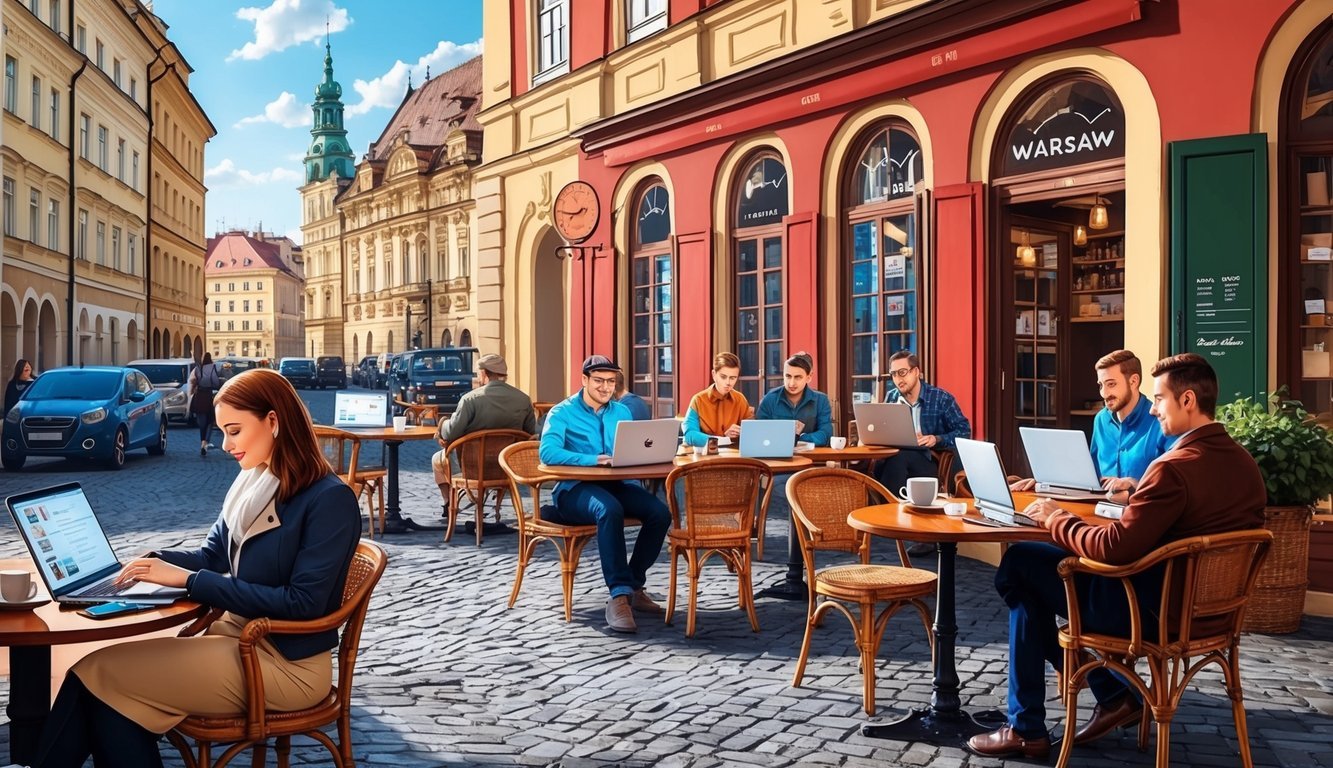
When you move to Warsaw as a digital nomad, you need to know about entry requirements, legalities, and how to create a comfortable base.
This will help you settle in and enjoy your time in the city.
Entry Requirements and Legalities
Before you pack your bags for Warsaw, check if you need a Schengen Visa.
If you’re from the EU or specific countries, you might not need one for short stays.
For others, a Schengen Visa allows you to stay for up to 90 days within a 180-day period.
If you plan to stay longer, consider applying for a national visa.
This is essential if you want to work in Poland.
You might also need to register your stay, especially if you’re settling down.
Make sure you have all the necessary documents ready, like proof of accommodation and health insurance.
Creating Your Base in Warsaw
Finding a place to stay in Warsaw is pretty straightforward. Accommodation options range from shared apartments to serviced flats.
You can expect to pay between €150 to €300 per month for decent rooms.
Check out neighborhoods like Mokotów for quieter living or Praga for a more artsy vibe.
When looking for spots, consider co-working spaces which are scattered across the city.
Places like Mindspace and Spaces not only offer fast internet but also a community vibe.
Be sure to join local expat groups online to find tips and recommendations for settling in.
Frequently Asked Questions
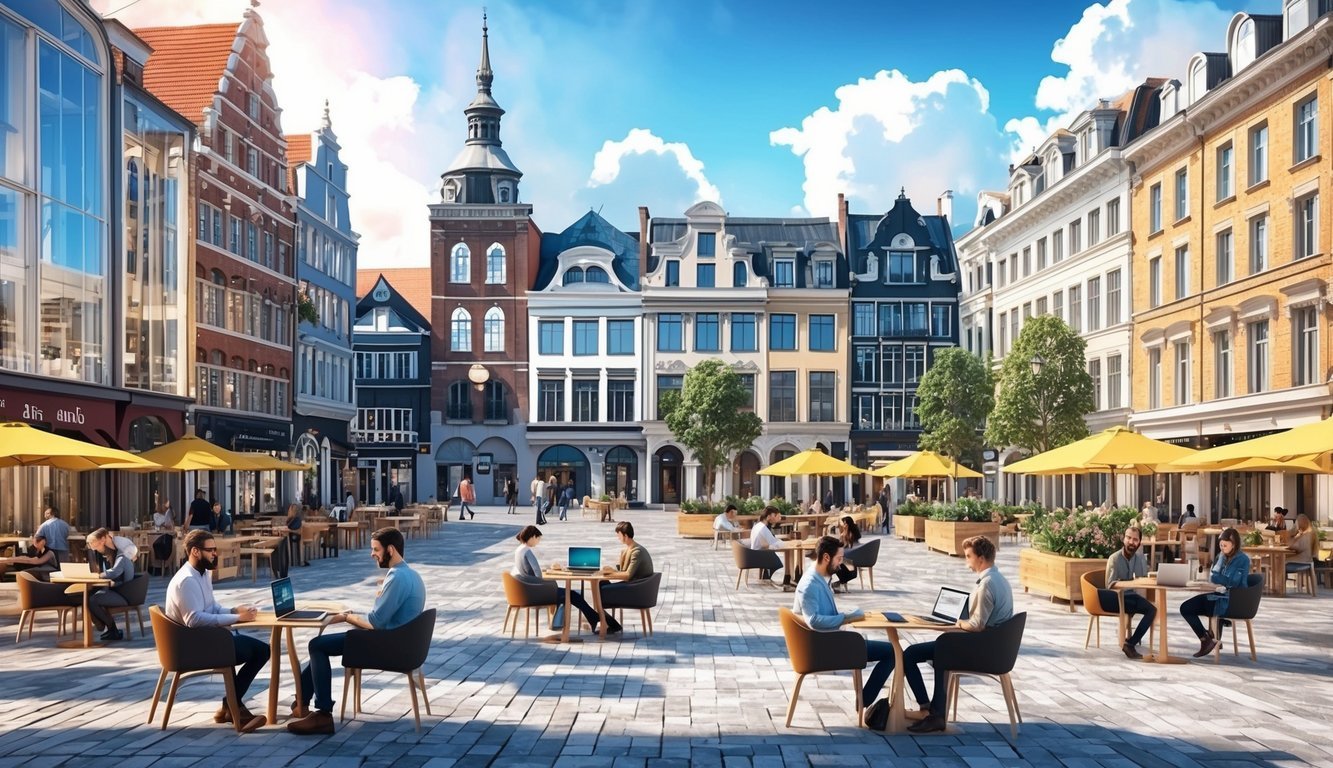
When thinking about living and working in Warsaw as a digital nomad, you likely have some questions.
Here’s a look at various aspects, from coworking spaces to job opportunities and everything in between.
What are the best coworking spaces for digital nomads in Warsaw?
Warsaw has a growing number of coworking spaces that cater to digital nomads.
Popular spots include Brain Embassy and Warsaw Wileńska.
These places offer great amenities like fast Wi-Fi, meeting rooms, and networking events.
You’ll find a vibrant community of remote workers in these spaces.
How affordable is Warsaw for digital nomads compared to other European cities?
Warsaw is generally more affordable than many other major European cities.
You can find decent accommodations for budgets ranging from €150 to €300 monthly.
Food and transport are also budget-friendly, making it easier to live comfortably while you work.
What are the social networking opportunities like for digital nomads in Warsaw?
The city has a lively community of digital nomads.
You can meet like-minded individuals at events hosted by popular coworking spaces or social media groups.
Cafes and parks are also great spots to connect while enjoying the city.
Can you give advice on finding short-term rentals in Warsaw for digital nomads?
Look for short-term rentals on websites like Airbnb or local rental platforms.
Many landlords are open to flexible lease terms.
Consider areas like Praga or Saska Kępa, which are popular among expats and offer a unique vibe.
What is the visa process like for digital nomads wanting to stay in Warsaw?
If you’re a digital nomad from outside the EU, check your country’s specific requirements for visas.
Poland offers some short-stay options that are relatively easy to apply for.
You might also explore opportunities for longer stays based on work or study permits.
Are there any job opportunities for English-speaking digital nomads in Warsaw?
Yes, Warsaw has a growing tech scene with many companies looking for English-speaking workers.
You can find opportunities in startups, marketing, and IT sectors.
Networking events can also provide leads on job openings in the city.

